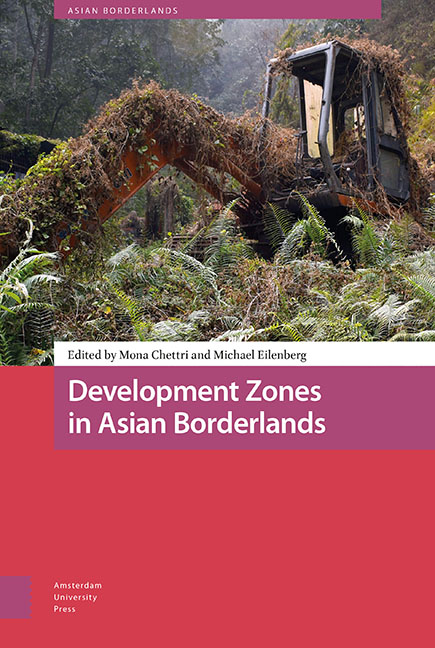Book contents
- Frontmatter
- Contents
- List of Figures and Tables
- Acknowledgements
- Introduction: Enclave Development and Socio-spatial Transformations in Asian Borderlands
- 1 Post-disaster Development Zones and Dry Ports as Geopolitical Infrastructures in Nepal
- 2 Onwards and Upwards: Aerial Development Zones in Nepal
- 3 Casinos as Special Zones: Speculative Development on the Nation’s Edge
- 4 Thinking the Zone: Development, Climate, and Heterodystopia
- 5 From Shangri-La to De facto SEZ: Land Grabs from “Below” in Sikkim, India
- 6 Development Zones in Conflict-Affected Borderlands: The Case of Muse, Northern Shan State, Myanmar
- 7 Smart Enclaves in the Borderland: Digital Obligations in Northeast India
- 8 Post-Disaster Economies at the Margins: Development, Profit, and Insecurities Across Nepal’s Northern Borderlands
- 9 Development from the Margins: Failing Zones and Suspended Development in an Indonesian Border Village
- 10 From Boom to Bust – to Boom Again?: Infrastructural Suspension and the Making of a Development Zone at the China-Laos Borderlands
- 11 Genealogies of Extraction: De Facto Development Zones in the Indonesian Borderlands
- Notes on Contributors
- Index
11 - Genealogies of Extraction: De Facto Development Zones in the Indonesian Borderlands
Published online by Cambridge University Press: 18 June 2021
- Frontmatter
- Contents
- List of Figures and Tables
- Acknowledgements
- Introduction: Enclave Development and Socio-spatial Transformations in Asian Borderlands
- 1 Post-disaster Development Zones and Dry Ports as Geopolitical Infrastructures in Nepal
- 2 Onwards and Upwards: Aerial Development Zones in Nepal
- 3 Casinos as Special Zones: Speculative Development on the Nation’s Edge
- 4 Thinking the Zone: Development, Climate, and Heterodystopia
- 5 From Shangri-La to De facto SEZ: Land Grabs from “Below” in Sikkim, India
- 6 Development Zones in Conflict-Affected Borderlands: The Case of Muse, Northern Shan State, Myanmar
- 7 Smart Enclaves in the Borderland: Digital Obligations in Northeast India
- 8 Post-Disaster Economies at the Margins: Development, Profit, and Insecurities Across Nepal’s Northern Borderlands
- 9 Development from the Margins: Failing Zones and Suspended Development in an Indonesian Border Village
- 10 From Boom to Bust – to Boom Again?: Infrastructural Suspension and the Making of a Development Zone at the China-Laos Borderlands
- 11 Genealogies of Extraction: De Facto Development Zones in the Indonesian Borderlands
- Notes on Contributors
- Index
Summary
Abstract
Taking departure from the failure of a planned but never realised special economic zone (SEZ) in the Indonesian borderland city of Tarakan, we argue that this planned SEZ would paradoxically not have been the island of sovereign exception often associated with SEZs, but rather a zone where central government would have had comparably more control than they have in the surrounding borderlands. This leads us to argue that the entire borderland surrounding Tarakan can be considered a de facto development zone in itself. Additionally, the de facto development zone is multigenerational, having been through a number of booms and busts, triggering both migrations and environmental ruination, while central state authority and interest have waxed and waned accordingly.
Keywords: development zones, ruins, maritime extraction, Indonesia
Introduction
In late 2015, the task force that for the past eight years had been working in the regional development office towards establishing a special economic zone (SEZ, or KEK in Indonesian) in Tarakan, a borderland city in Indonesia, closed down. It was a rather unremarkable event, not even reported by the local newspapers. The hope had been to develop KEK Tarakan as part of a national government programme to establish centres of economic growth in less developed parts of Indonesia, such as the borderlands on the island of Borneo. The initially ambitious project was stranded on disagreements between national and regional governments as well as a lack of serious interest from the industries it was supposed to support.
Why did this particular development zone never materialise at a time when SEZs are proliferating across Indonesia as well as in borderlands around Southeast Asia? Our argument in this chapter is twofold. We argue that the borderland surrounding Tarakan can be analysed as a de facto development zone. It turned out that there simply was no widespread local need for a SEZ to be established, because most of the formal benefits of such a zone were already there in practice. On the contrary, the local government and businesses were wary that a formal SEZ might bring increased scrutiny and control from the national government in Jakarta. The second part of our argument is that this de facto development zone is multigenerational and has been undergoing a continual process of reconstruction and deconstruction for a long time.
- Type
- Chapter
- Information
- Development Zones in Asian Borderlands , pp. 253 - 276Publisher: Amsterdam University PressPrint publication year: 2021

